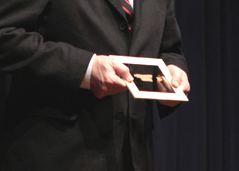
FORT WORTH, Texas (BP)–Pieces from what many scholars argue is the greatest archaeological discovery of the 20th century have found a permanent residence at Southwestern Baptist Theological Seminary in Fort Worth, Texas.
Southwestern trustee Gary Loveless presented President Paige Patterson with the collection during a seminary chapel service Jan. 20.
Loveless, founder and CEO of Square Mile Energy in Houston, provided the lead gift for the purchase of the fragments, which were acquired from a private collector in Europe. The collection makes Southwestern one of only a handful of institutions of higher education in the United States to possess pieces of the Dead Sea Scrolls.
“It is my earnest belief that these scrolls, which contain God’s holy Word, need to be secured in a place where they will be revered and respected for exactly what they are,” said Loveless, with his wife Stephanie by his side.
“Although one can’t deny or ignore the historical or archaeological value of these fragments, it is most important to me and Stephanie that they are in the hands of those that will acknowledge and honor their Christian and Jewish heritage and significance. It is for that reason that there’s no better institution than Southwestern in our opinion to secure these for the glory of God.”
Patterson expressed great appreciation on behalf of the seminary for the Loveless’ extraordinary generosity. Early analysis shows the fragments owned by Southwestern include portions of Exodus 23, Leviticus 18 and Daniel 6, although the seminary will conduct further study on the pieces. A pen made from a Palm tree, which was found with the Dead Sea Scrolls and presumably used by the scribes who wrote them, also was gifted to the seminary as part of the collection. It is only one of three pens known to exist from the Dead Sea Scroll discoveries.
“I am particularly grateful for having the Daniel fragments,” Patterson said. “Daniel is one of the most attacked books in the Bible.” Citing the amazing accuracy with which Daniel prophesies events, some scholars have said it is not truly prophecy but rather history written in a prophetic style. Evangelical Christians who hold to biblical inerrancy reject this notion and, instead, believe that it was, indeed, prophecy written before the events.
Patterson said the discovery of Daniel fragments in the Dead Sea Scrolls showed that “it was clear that these were copies of copies of copies so that it established the certainty that Daniel was written when it claims to have been written.”
In 1947, Bedouins discovered the scrolls in caves overlooking the Dead Sea near the ancient city of Qumran east of Jerusalem. Nearly 10 years of excavation in the caves produced fragments from approximately 825 to 870 separate scrolls containing biblical manuscripts, biblical manuscripts with commentary, apocryphal manuscripts and extra-biblical literature.
The Dead Sea Scrolls have made a profound impact on biblical studies, especially in the area of scribal transmission. Dating back to the time of Christ, these documents pre-date the Masoretic Text of Hebrew Scriptures by 1,000 years.
Weston Fields, executive director of the Dead Sea Scrolls Foundation, organization dedicated to the preservation and publication of the scrolls, said in a telephone phone interview, “Any piece of the Dead Sea Scrolls is significant because it shows us what the state of the Hebrew text of the Bible was 2,000 years ago, which gives us a way to measure whether or not they’ve been faithfully transmitted over the last 2,000 years.”
Fields added that “what they do tell us is that there has been very little change. They show how faithfully the Bible has been transmitted.”
Steven Ortiz, associate professor of archaeology and biblical backgrounds and director of the Charles D. Tandy Archaeology Museum at Southwestern, believes the collection will provide students with the opportunity for a rare type of scholarship.
“As a young graduate student, you read about the Dead Sea Scrolls in all of your textbooks,” Ortiz said in a press conference. “Students in our program will also have that same type of discovery, but not just reading about it in a textbook, but we have the actual scrolls. Students will be able to do research on them [because] they’re easily accessible for scholarship.”
Southwestern currently offers a master of arts in archaeology and biblical studies and currently is developing plans for a doctoral program in archaeology. The seminary recently broke ground on a new 3,500-seat chapel. Construction plans include a state-of-the-art library to house the Dead Sea Scrolls fragments as well as other ancient documents, such as several cuneiform tablets, which are presently housed in the Tandy Archaeological Museum. Named in honor of Loveless’ grandmother, Ira Leeta Phillips, the new library will provide a secure climate-controlled environment for the rare treasures to be preserved and displayed.
Southwestern plans to have the three fragments studied further by textual scholars and archaeologists, who will work closely with students and faculty in Southwestern’s archaeology department. The seminary already sponsors an archaeological dig in Tel Gezer, a city prominent during the reign of the Israelite king Solomon.
Southwestern’s Dead Sea Scrolls collection eventually may travel on occasional museum exhibits to educate the public about the historic nature of these precious treasures, but no definitive plans or agreements have yet been made.
–30–
Keith Collier is director of news and information at Southwestern Baptist Theological Seminary in Fort Worth, Texas (www.swbts.edu/campusnews).

















